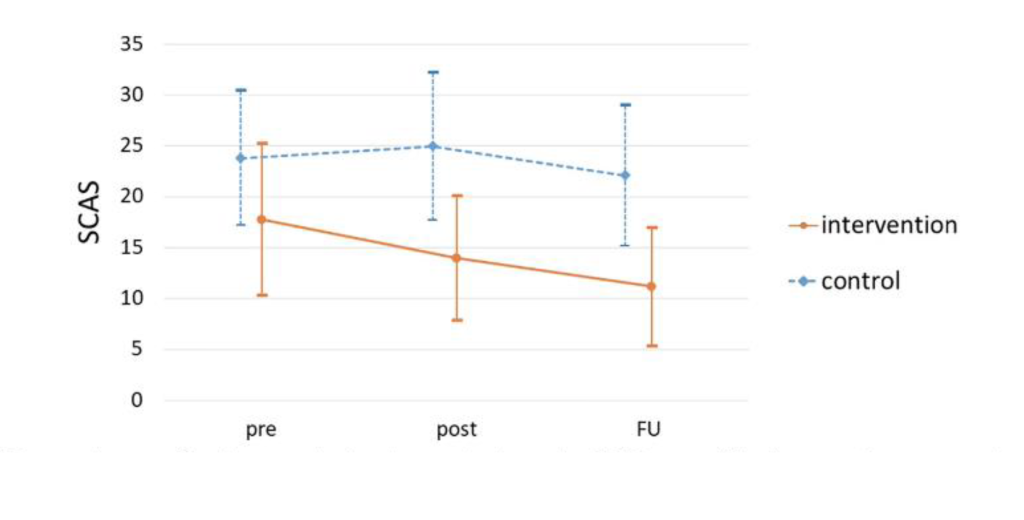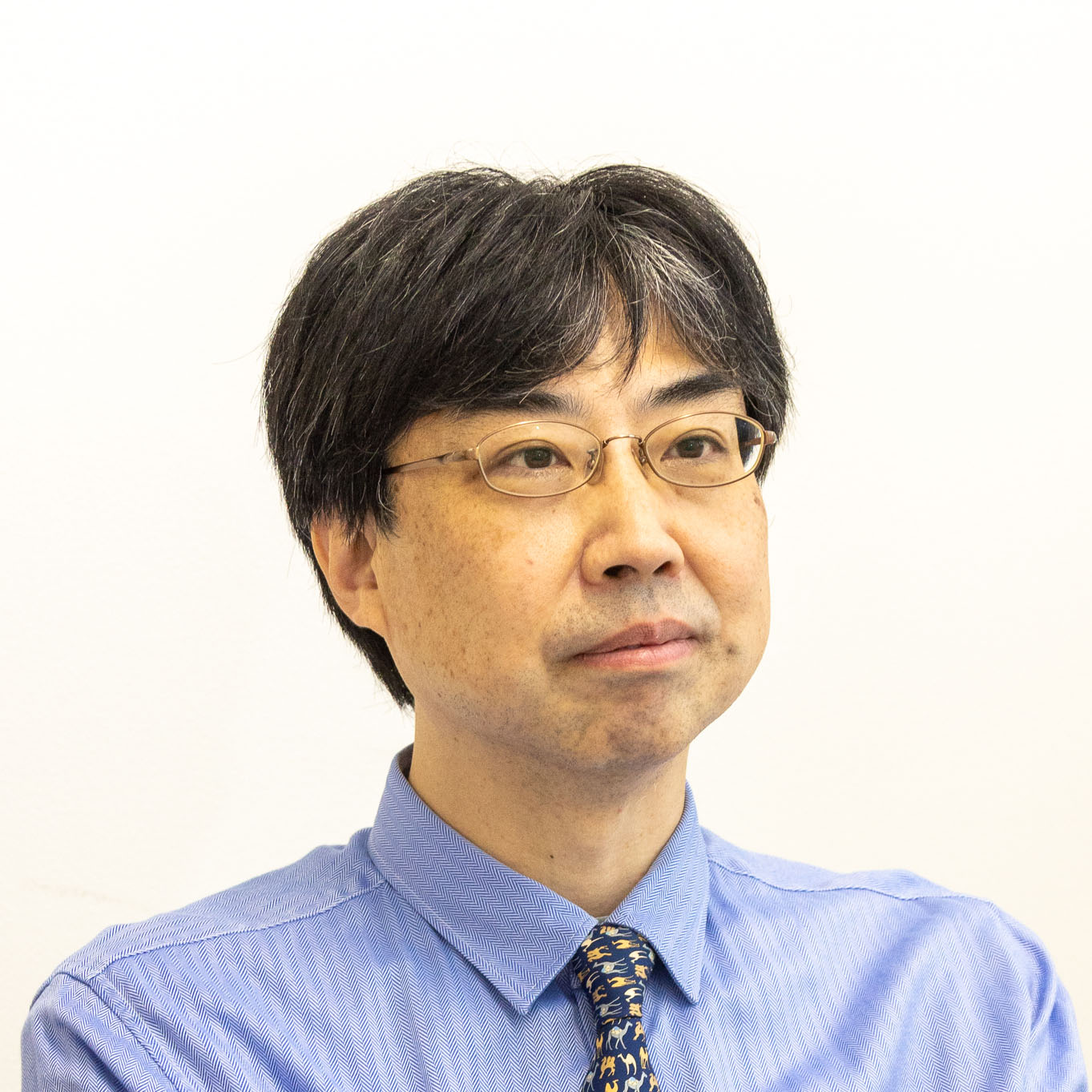Researchers developed 20-minute-long (14 sessions) cognitive behavioral interventions to prevent anxiety problems in school-going children in Japan
Journey of the Brave is a cognitive behavioral intervention program developed in Japan to prevent school children’s anxiety disorders. However, it takes a substantial amount of time to complete and has not spread as much as intended. To this end, a research team of Journey of the Brave developed a shorter version of the program, which only requires 20 minutes per session. It demonstrated promising results in children aged 10-11 by reducing their symptoms of anxiety.

Image title: Mean total SCAS score change in the intervention and control groups
Image caption: A study conducted in Japan indicated that children who underwent 20-minute -long cognitive behavioural therapy-based programs exhibited lower symptoms of anxiety as compared to children who did not
Image credit: Yuko Urao from Chiba University
Image license: Original content

Image title: Illustration from the Journey of the Brave
Image caption: Journey of the Brave is a behavioral intervention program that was developed with an aim to reduce anxiety among school-going children in Japan
Image credit: Yuko Urao from Chiba University
Image license: Original content
Anxiety disorders are highly prevalent psychological disorders among children. Anxiety negatively affects a child’s sense of self-esteem, leading to under-achievement in school. Moreover, anxiety may exacerbate low self-esteem in children who already experience it. This increases their likelihood of avoiding socialization, indulging in negative interactions with their peers, and remaining absent from classes. If left untreated, anxiety can lead to severe psychological disorders over time. To remedy this, a preventive intervention based on Cognitive Behavioral Therapy (CBT) for children— ‘Journey of the Brave’— was developed and introduced in Japanese schools in 2014.
While the program was somewhat effective, each CBT session took 45 minutes to complete over a span of 10 weeks, during which the regular class time was lost. In Japan, school going children have busy schedules due to a packed school curriculum, and it is quite difficult to set time aside for a preventive program.
Recently a team of researchers led by Dr. Yuko Urao—a Specially Appointed Lecturer at the Research Centre for Child Mental Development, including Dr. Eiji Shimizu and Ms. Michiko Yoshida from the Graduate School of Medicine, Chiba University, and Dr. Yasunori Sato from Keio University School of Medicine, Japan developed a streamlined and shorter version of the Journey of the Brave CBT-program. Their findings were published online on October 25, 2022, in Volume 22 of BMC Psychiatry.
“The effectiveness of the CBT-based anxiety prevention program “Journey of the Brave”, aimed at Japanese higher-grade elementary school children has been confirmed by previous studies. But to implement and spread it on a large scale was problematic due to difficulties in securing extensive class time of ten 45-minute-long sessions,” said Dr. Urao while discussing the motivation behind the study.
The team spent 14 weeks and designed the sessions to only last for 20 minutes. They conducted them during the homeroom activity time in the morning instead of after school hours, for children aged 10–11 of a Japanese school. This age group was targeted since children of these ages experience class shuffle and tend to take on new responsibilities as school or class leaders.
Further, the children were divided into control and intervention groups, with the former not attending any CBT-based sessions. The team assessed the children at the pre-intervention and post-intervention stages, as well as during a 2-month follow-up period. Their anxiety-based symptoms were measured using the Spence Children’s Anxiety Scale (SCAS), and the behavioral problems were measured using the Strengths and Difficulties Questionnaire (SDQ).
The findings suggested a statistically significant reduction in the SCAS scores during the 2-month follow-up period, as well as a reduction in the SDQ scores. These findings suggest that the children benefitted from the CBT-based program when it was delivered in a short and divided format.
“Since this version of the program is shorter, a greater number of schools will be able to implement it. In addition, the greater number of schools participate, the more teachers will be able to focus on children’s anxiety. Moreover, it will lead to an improved school environment where children will retain their peace of mind.” Dr. Urao said while discussing the findings.
Why is it important to prevent symptoms of anxiety of schoolchildren? Dr. Urao muses, “When CBT-based anxiety prevention programs prevail and help children learn self-control over their anxious feelings, their mental-health related problems will decrease, allowing them to grow to their full potential.”
About Dr. Yuko Urao
Dr. Yuko Urao is a specially appointed lecturer working at the Research Centre for Child Mental Development at Chiba University, Japan. Dr. Urao is also a Lecturer at the United Graduate School of Child Development at Osaka University. Her research primarily focuses on cognitive behavioural therapy, and she has published multiple papers on this topic. She also has over 70 citations to her credit and has also been awarded the Excellent Presentation Award for Young Researchers by the Japanese Society of Anxiety and Related Disorders.
Reference:
Title of original paper: School-based cognitive behavioural intervention programme for addressing anxiety in 10- to 11-year-olds using short classroom activities in Japan: a quasi-experimental study
Authors: Yuko Urao1*, Michiko Yoshida2, Yasunori Sato3 and Eiji Shimizu1,2
Affiliations:
- Research Centre for Child Mental Development, Chiba University, 1-8-1 Inohana, Chuo-ku, Chiba 260-8670, Japan
- Department of Cognitive Behavioral Physiology, Chiba University, Graduate School of Medicine, 1-8-1 Inohana, Chuo-ku, Chiba 260-8670, Japan
- Department of Preventive Medicine and Public Health, Keio University School of Medicine, 35 Shinanomachi, Shinjuku-ku, Tokyo 160-8582, Japan.
DOI: 10.1186/s12888-022-04326-y
Contact:
Yuko Urao
Research Centre for Child Mental Development, Chiba University
Email: yurao@faculty.chiba-u.jp
Public Relations Office, Chiba University
Address: 1-33 Yayoi, Inage, Chiba 263-8522, JAPAN
Email: koho-press@chiba-u.jp
Recommend
-

The Joy of Work and The Delight of Nurturing: From Social Farming to Universal Farms
2025.02.10
-

What causes nations and regions to perceive the COVID-19 crisis differently?〜Insights from the Humanities and Social Sciences Needed for Disaster Management Research
2022.12.12
-

The Science Behind Nature’s Touch: Horticultural Therapy and Community Well-Being
2025.01.14


